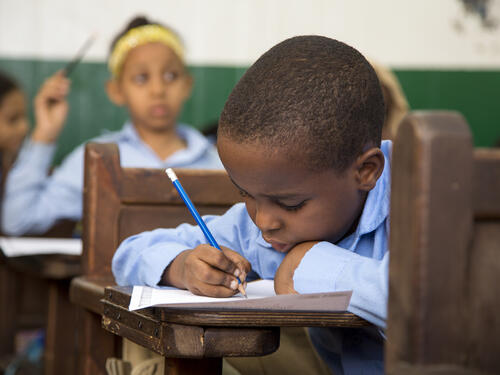Education
Education
Education offers a stable and safe environment for displaced children, helps people to rebuild their communities, and pursue productive, meaningful lives.

Close to half of all refugee children – 48 per cent – remain out of school.
At pre-primary level, the average gross enrolment rate for the academic year 2020 to 2021 for reporting countries was 42 per cent.
For primary level, the corresponding rate for reporting countries was 68 per cent. For secondary level, it was 37 per cent, illustrating that significant structural barriers remain for refugee learners to access post-primary education. At tertiary level, enrolment rates for the same period were at 6 per cent.
This increase, of 3 percentage points since 2019, represents a transformational change for thousands of young people and their communities.
Of the 20.7 million refugees under our care, 7.9 million are refugee children of school age. Their access to education is limited, with almost half of them unable to attend school at all.
The New York Declaration for Refugees and Migrants pinpoints education as a critical element of the international refugee response. Furthermore, Sustainable Development Goal 4 aims to deliver “inclusive and quality education for all and to promote lifelong learning”.
UNHCR partners with governments and international organisations to ensure quality protective education for refugee children and young people everywhere. Together with your help, they can learn how to rebuild their lives.
Education is a basic human right, enshrined in the 1989 Convention on the Rights of the Child and the 1951 Refugee Convention.
Education protects refugee children and youth from forced recruitment into armed groups, child labour, sexual exploitation and child marriage. Education also strengthens community resilience.
Education empowers by giving refugees the knowledge and skills to live productive, fulfilling and independent lives.
Education enlightens refugees, enabling them to learn about themselves and the world around them while striving to rebuild their lives and communities.


